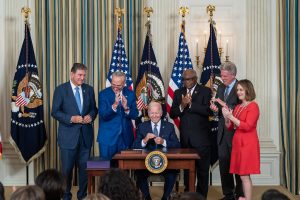When work on a $4 billion manufacturing plant for Vietnamese automaker VinFast began in North Carolina in July 2023, Ted Osius, the head of the U.S.-ASEAN Business Council, expressed a hope shared by many companies and governments in the Southeast Asian electric vehicle (EV) space: that they would be eligible for tax credits under the U.S. Inflation Reduction Act (IRA).
These hopes were made possible by Washington’s new security-focused industrial policy approach amid rising competition with Beijing. As National Security Advisor Jake Sullivan expressed in an April speech, Washington aims to prevent Beijing from weaponizing its dominance over global clean-energy supply chains. In line with this, the IRA, signed one year ago this week, was meant to build a clean-energy manufacturing network that eases over-reliance on China by catalyzing private investments and “friendshoring,” or recalibrating supply chains to friendly countries. The tax credits offered under Section 45W of the IRA, which offers up to $7,500 for each EV bought in the United States, are a key component of this policy effort.
There are many conditions that govern eligibility for these tax credits. For example, final assembly of the EV must occur in North America. At least 40 percent of EV battery minerals must also be extracted or processed in the United States or partners with whom it has free trade agreements, though a U.S. Treasury Department ruling extended the definition of “free trade agreements” to the critical minerals agreement with Japan.
Nonetheless, countries with EV manufacturing aspirations such as Vietnam, or with EV battery ambitions such as Indonesia and the Philippines have all expressed interest in these tax credits. The financial incentives are very appealing – by one estimate, South Korean EV battery makers could earn an annual collective subsidy of $8 billion from U.S. taxpayers based on planned capacity.
However, the reality of implementing this tax credit policy is complicated. Not only could geopolitical tensions drive strict requirements that limit tax credit eligibility, but broader uncertainty in U.S. politics could raise questions about the longevity of the IRA.
One of the biggest obstacles for Southeast Asian countries looking to qualify for tax credits lies in the IRA’s exclusion of EVs with battery components manufactured or assembled by a “foreign entity of concern,” ostensibly referring to China.
Unfortunately for Washington, Southeast Asian countries rely heavily on Chinese expertise and investments to support their EV activities. Indonesia is the world’s single largest source of nickel, but its nickel market is dominated by Chinese companies that provided the technological breakthrough to mass-refine nickel. Likewise, VinFast partnered with Chinese battery producer Gotion High-Tech for its EV line.
The presence of Chinese companies in Southeast Asian mineral markets is not a matter of geopolitics. Chinese companies simply have the knowhow and resources to help build their local industries. Nonetheless, while the United States has yet to draw up detailed guidance on what constitute “foreign entities of concern,” it is likely that Washington will do its utmost to prevent Chinese companies from benefiting from the IRA.
The risks are real for Washington, with reports that Chinese firms are investing heavily in South Korean battery factories to exploit a loophole involving South Korea’s free trade agreement with the U.S. to reap IRA tax credits. Yet the big concern for its Southeast Asian partners is how much collateral damage they might incur from any of Washington’s policies vis-à-vis China.
Beyond geopolitics, there are many practical challenges for the implementation of IRA tax credits. As South Korea discovered, Washington has been relatively inflexible over the need for final assembly of an EV to occur in North America. Even though U.S. President Joe Biden personally thanked Hyundai Chair Chung Eui-sun for deciding to build a $5.5 billion EV plant and battery manufacturing factory in Georgia, Hyundai will be ineligible for tax credits until the plant is ready in 2025.
These practical challenges can be managed if countries believe that the benefits outweigh the costs. Unfortunately, a lack of trust in U.S. policy direction would affect these calculations.
Foreign trade leaders have expressed worries over the longevity of the tax credit scheme if Republicans reclaim the White House in 2024, given how many Republican lawmakers opposed the IRA’s passage. Democratic lawmakers, too, have criticized the IRA for bypassing Congress’ role in trade matters. Even if Democrats retain the White House in 2024, some party members have hinted at legal action to challenge the Biden administration’s interpretation of “free trade agreements,” raising questions about Washington’s policy direction.
Ultimately, as Washington embarks on this highly securitized version of industrial policy against an increasingly fraught political backdrop, Southeast Asian countries should be aware of the risks entailed in their potential investments. Signing more critical minerals agreements, increasing supply chain resilience, or even entering the U.S. EV market are worthy goals. Investing in a multi-billion-dollar factory solely to reap these IRA tax credits, however, might turn out to be a risky bet with a questionable payoff.

































